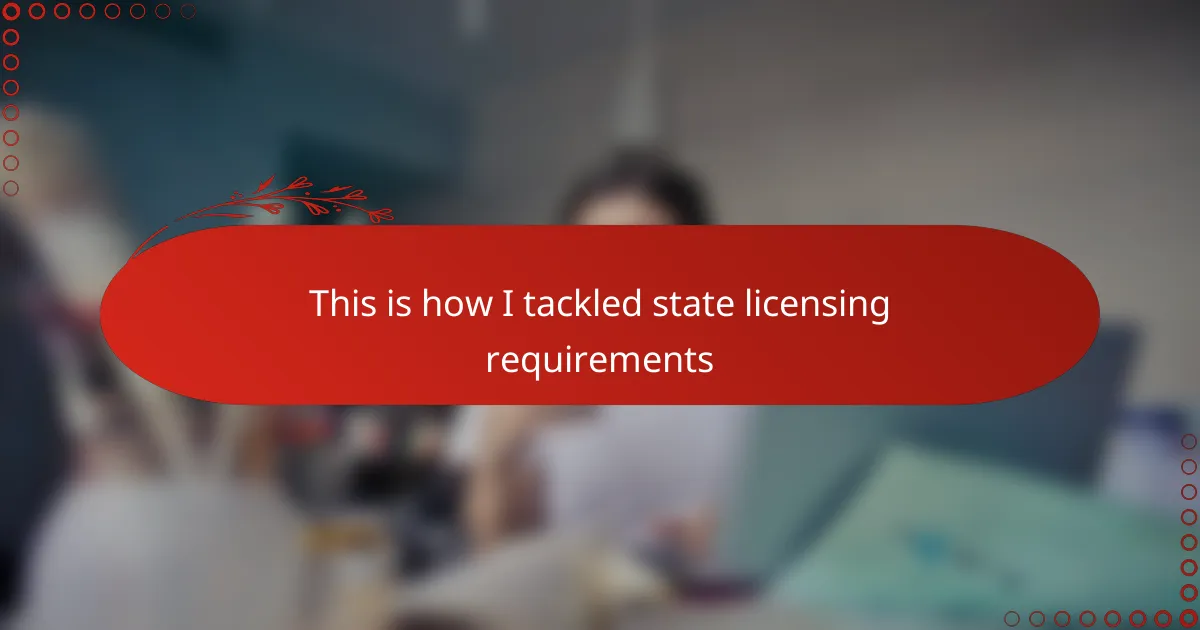Key takeaways
- Understanding state licensing is vital for effective radio broadcasting, emphasizing the importance of researching specific state requirements.
- Creating checklists and organizing documentation simplifies compliance with federal and state broadcasting regulations.
- Maintaining ongoing communication with licensing offices and networking with fellow broadcasters can provide essential support and clarity throughout the licensing process.
- Establishing a system for tracking compliance steps and deadlines is crucial for avoiding costly mistakes and ensuring continuous adherence to regulations.
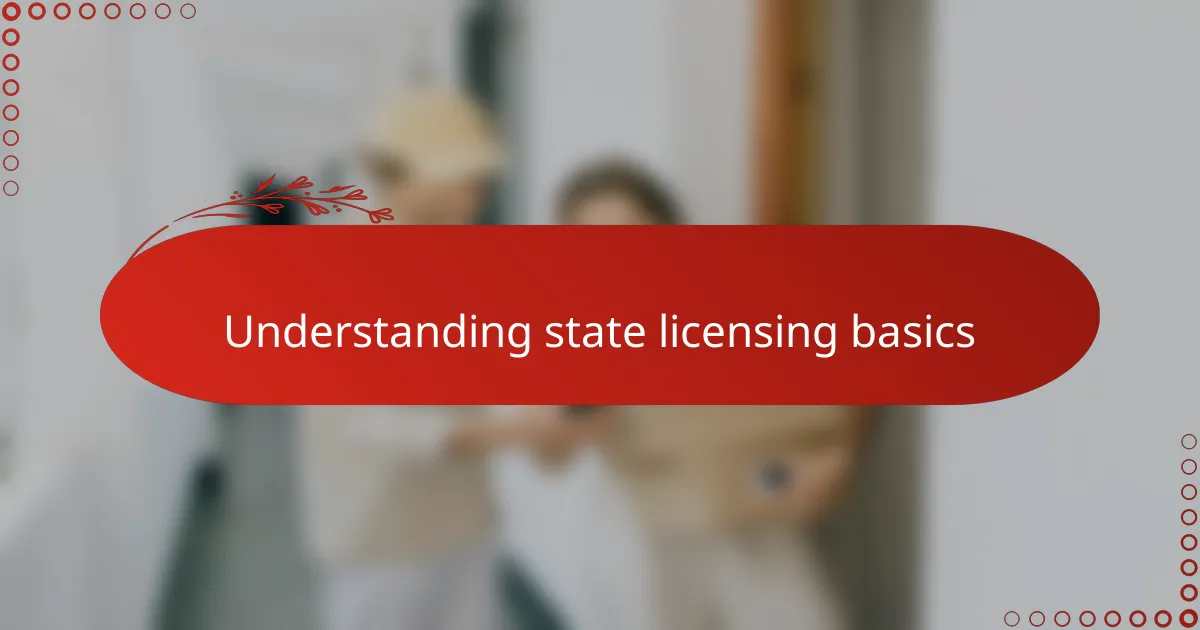
Understanding state licensing basics
Navigating state licensing felt overwhelming at first. I kept asking myself, what exactly does the state require for radio broadcasting? Understanding that licenses vary by location made me realize the importance of researching my specific state’s rules before moving forward.
I discovered that state licensing isn’t just a formality—it’s a way to protect frequencies and ensure clear communication. That made me appreciate the system more, even though the paperwork and fees initially seemed daunting. Have you ever felt that regulatory steps are just obstacles? I did, but learning their purpose helped me approach the process with a different mindset.
One key insight I gained was that each state has a regulatory body responsible for issuing licenses, often tied to the Federal Communications Commission (FCC) requirements. This layered approach means staying organized and attentive to multiple agencies. Trust me, keeping track of deadlines and specific forms saved me from costly mistakes later on.
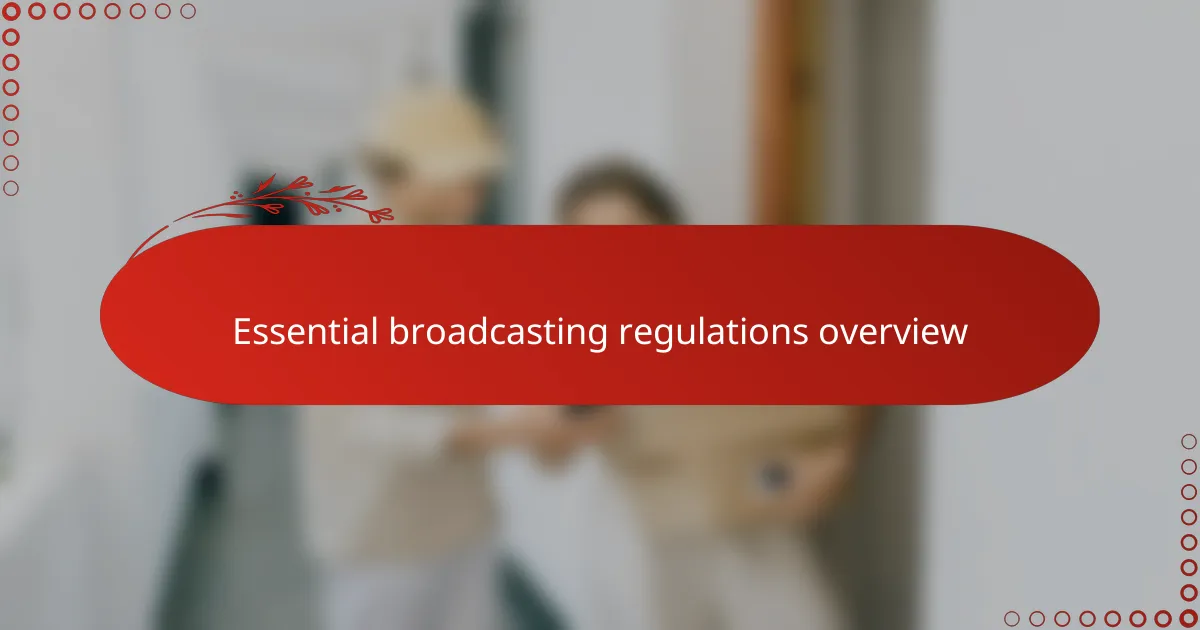
Essential broadcasting regulations overview
Broadcasting regulations often feel like a maze when you first dive in. I remember staring at pages of rules, wondering how I could possibly stay compliant while trying to get my station on air. But understanding that these regulations exist to prevent signal interference and protect listeners’ interests really changed how I viewed the process.
One detail that caught me off guard was the mix of federal and state requirements. You might think it’s confusing, and honestly, it was at first for me too. I ended up creating a simple checklist to track which forms and deadlines applied at each level — that small step made a world of difference.
Have you ever been frustrated by legal jargon? I sure have. Breaking down each regulation into plain language helped me feel empowered rather than overwhelmed. Now, I see it as a necessary part of running a trustworthy and professional station.
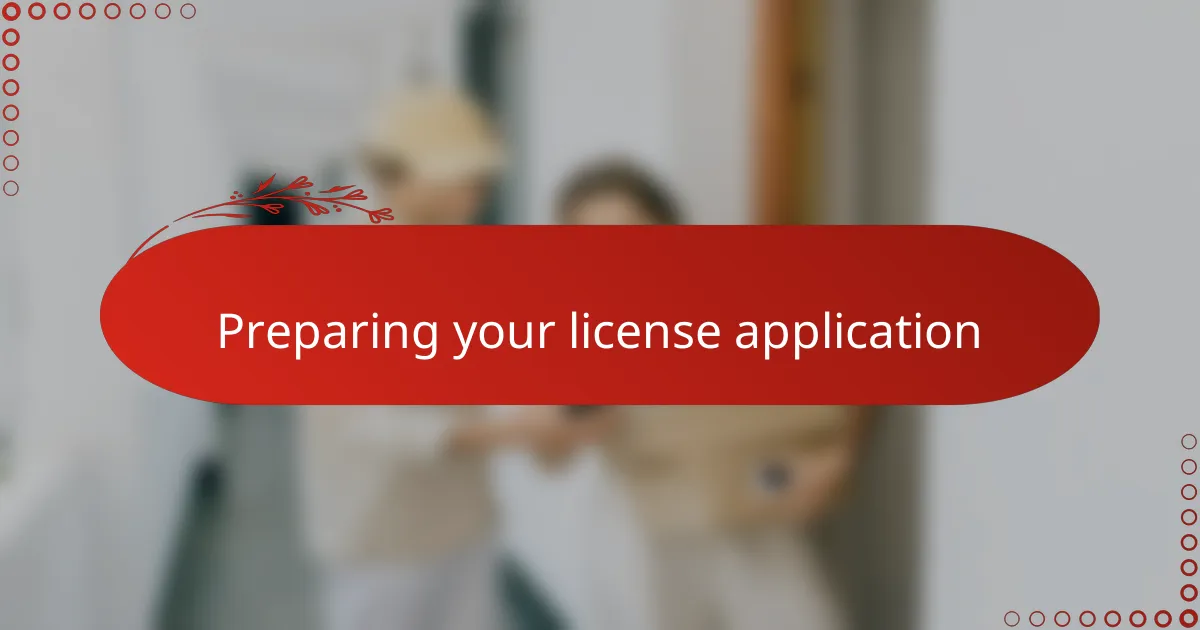
Preparing your license application
Preparing your license application was one of those tasks that felt like staring at a mountain I wasn’t sure I could climb. I remember printing out forms and reading instructions multiple times, wondering if I missed a crucial detail. Have you ever been stuck wondering if your paperwork is really complete or if you need to attach one more document? That uncertainty kept me cautious and double-checking everything.
I found that gathering all the necessary documents beforehand made the process smoother. Things like proof of frequency coordination, technical specifications, and identification had to be organized carefully. It’s surprising how much clarity a simple folder labeled “License Application” brought me—everything I needed was right there at my fingertips.
One trick that helped me immensely was reaching out to someone already licensed in my state. Their tips on common mistakes saved me from submitting incomplete applications. Don’t hesitate to ask for advice—you’re not alone in this, and practical insights can make a big difference when preparing your submission.
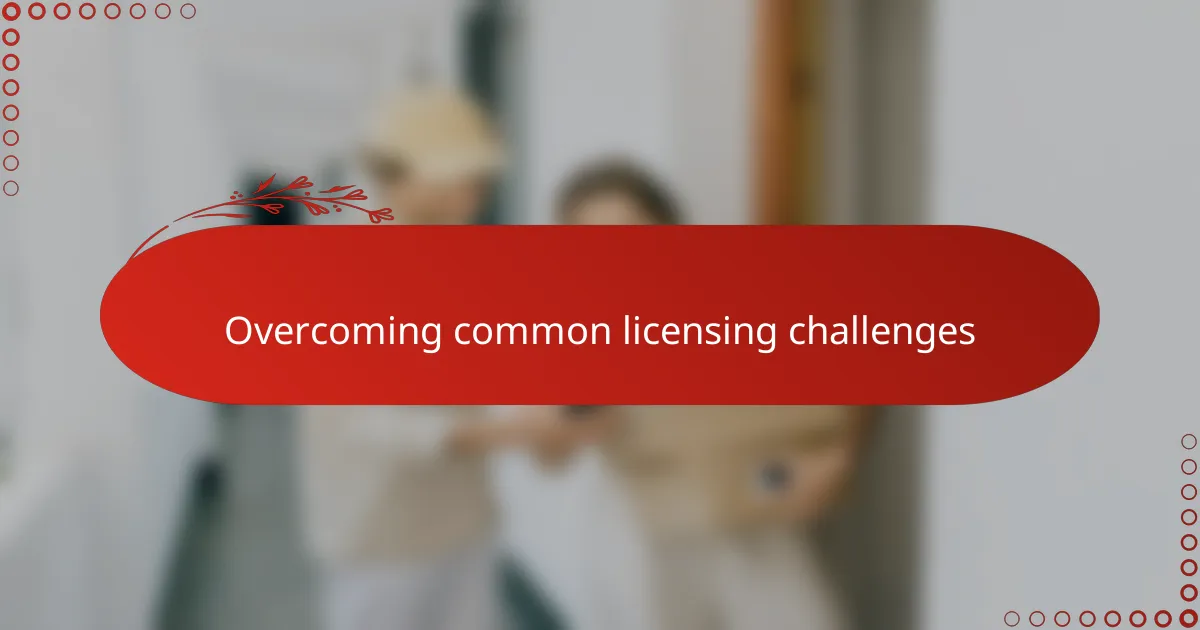
Overcoming common licensing challenges
Licensing hurdles often feel like stumbling blocks when you least expect them. I once hit a snag trying to interpret a confusing clause about signal strength limits—did I really have to adjust my antenna just to meet that? Facing that challenge head-on taught me the value of patience and reaching out for clarification, instead of guessing and risking rejection.
Another common pitfall was juggling renewal deadlines across multiple agencies. I thought I’d easily remember, but a missed date almost cost me my broadcast rights. That experience pushed me to set up calendar alerts and maintain a detailed timeline. Have you ever relied on memory alone for something so critical? It rarely works in my experience.
Sometimes, the paperwork itself feels like an insurmountable obstacle. When I finally sat down and broke the forms into bite-sized sections, completing each one felt less intimidating. Taking small, manageable steps made the whole process feel doable—and even a bit satisfying. Would breaking things down like that help you approach your licensing challenges more confidently? It definitely helped me.
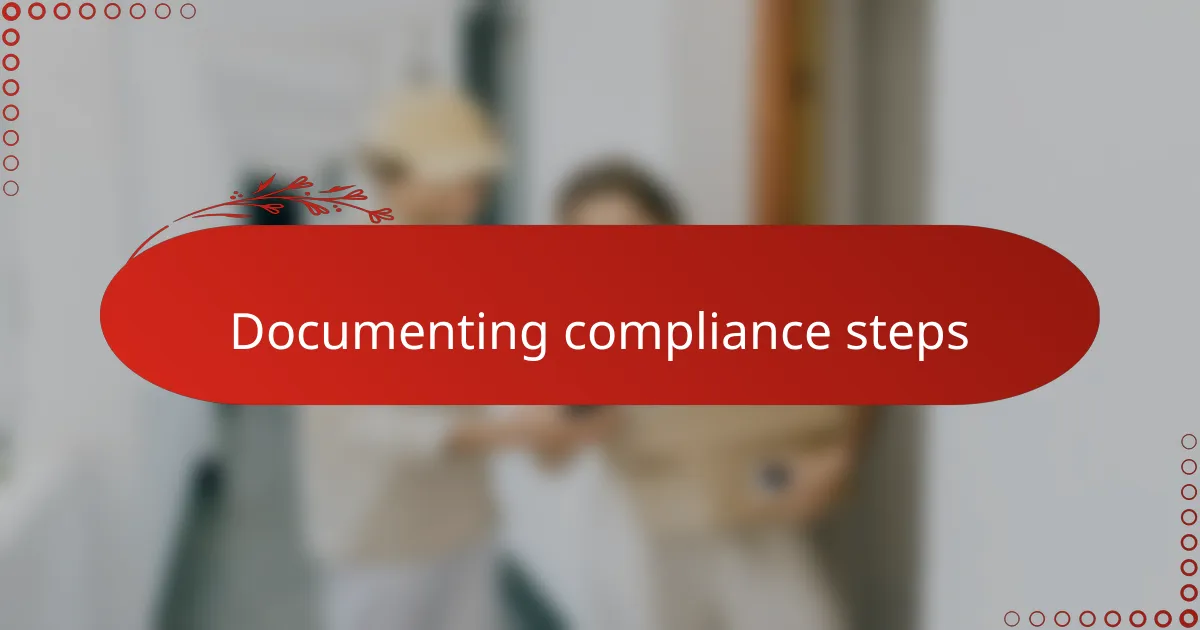
Documenting compliance steps
When it came to documenting each compliance step, I quickly realized that keeping detailed records was a game-changer. Have you ever tried retracing your moves only to find crucial information missing? That frustration pushed me to create a dedicated log, noting every form submitted, dates, and any correspondence with regulatory bodies. This habit saved me countless headaches when questions arose later.
I also found that organizing digital copies alongside physical documents made accessing what I needed far easier. Trust me, nothing beats the relief of finding that one elusive approval letter within seconds rather than hours. Plus, having everything in one place boosted my confidence—I knew I could prove compliance whenever required without scrambling.
Did documenting feel tedious at times? Absolutely. But looking back, it was a necessary investment that turned potential chaos into clear, manageable steps. I kept reminding myself that if a state auditor showed up tomorrow, I’d be ready—and that peace of mind kept me going.
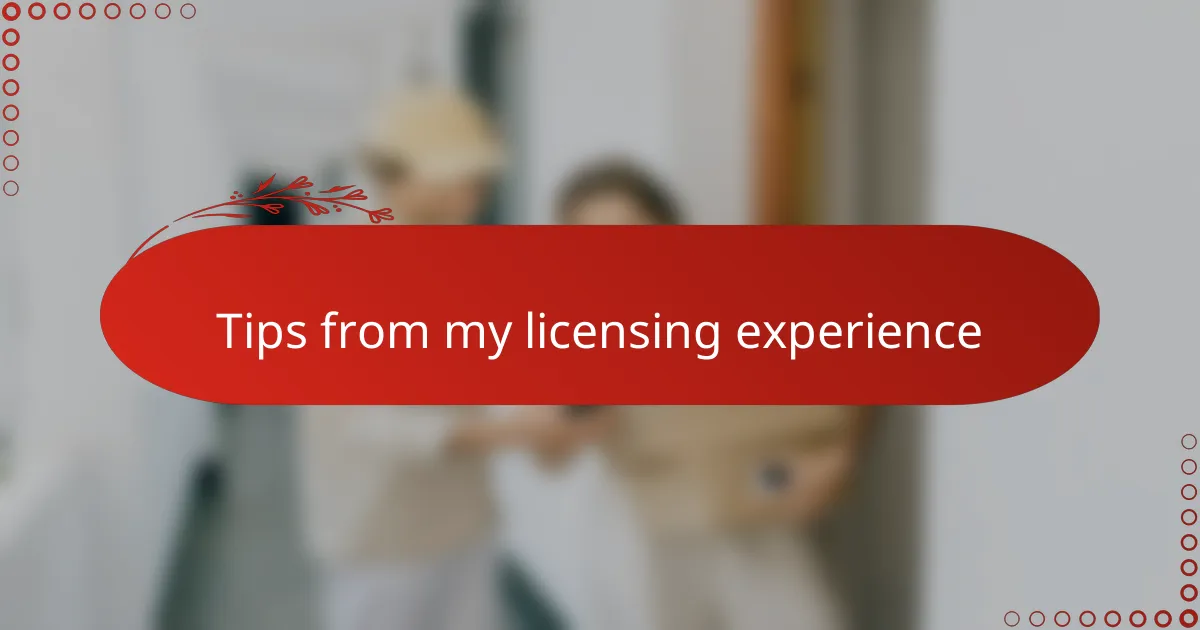
Tips from my licensing experience
One tip I can’t stress enough is to give yourself plenty of time. Have you ever rushed through paperwork and ended up making avoidable mistakes? I sure have, and it taught me to start the licensing process early, so there’s room to fix errors and gather missing information without panic.
Another thing that really helped me was staying in constant communication with the licensing office. At first, I hesitated to ask questions, fearing I might sound clueless. But reaching out made a huge difference — they’re usually willing to clarify confusing points, and that saved me from guesswork and frustration.
Lastly, I found it invaluable to build a network of fellow broadcasters who had been through the licensing journey. Sharing tips, swapping experiences, and getting moral support turned what felt like a lonely, complex task into something more manageable and even encouraging. Have you tried connecting with others in your field? It might just be the best advice you don’t know you need.
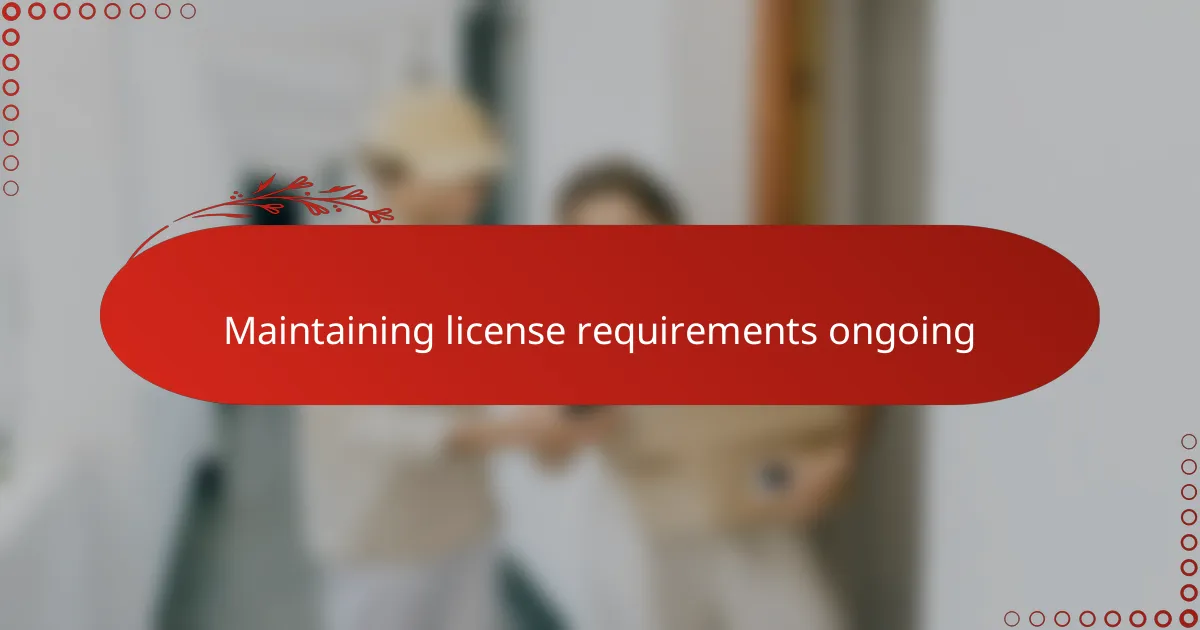
Maintaining license requirements ongoing
Keeping up with license requirements is where the real challenge begins. I quickly learned that it’s not just about getting the license once, but about staying vigilant with renewals, reporting, and any changes in regulations. Have you ever felt overwhelmed trying to remember all those deadlines? Setting up calendar reminders and routine check-ins with the state’s regulatory website saved me from last-minute scrambles.
I also realized that ongoing compliance requires constant attention to detail. For example, after an equipment upgrade, I had to submit updated technical specs to maintain transparency. Ignoring small updates might seem tempting, but in my experience, it only leads to bigger headaches down the line. How could you ensure every tiny change doesn’t slip through the cracks? For me, keeping a dedicated compliance folder helped keep things organized and stress-free.
Lastly, patience became my best tool during this ongoing process. Regulations sometimes shift, and responding quickly is crucial. I found that reaching out early when uncertain about new requirements turned potential issues into simple clarifications. Have you tried leaning on the licensing office as a resource rather than an obstacle? That shift in mindset made all the difference for me.
